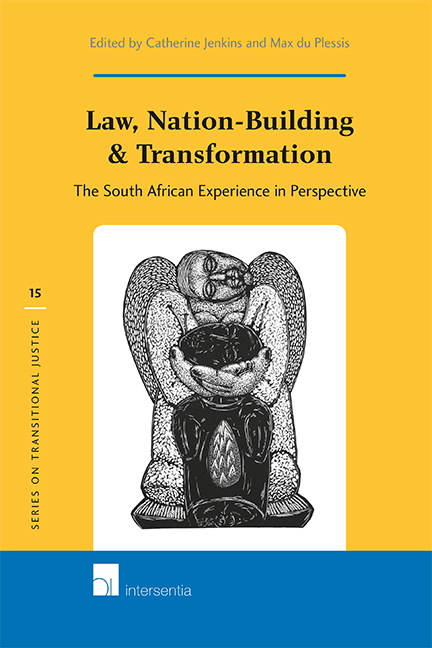Book contents
- Frontmatter
- Editors’ Foreword
- Contents
- Chapter 1 Transitional Justice: Lessons from South Africa?
- Chapter 2 Reflections on Post-Apartheid Nation-Building: Identity, Participation, Community
- Chapter 3 The Truth and Reconciliation Commission Process: A Retrospective
- Chapter 4 Rights at Work: The Transition to Constitutional Democracy and Women in South Africa
- Chapter 5 Crime, Policing and Nation-Building
- Chapter 6 Public Schools for Afrikaners in South Africa
- Chapter 7 Behind the Mask of the Rainbow Nation: The Limits of Law in Post-Apartheid South Africa
- Chapter 8 The Transformation of the Judiciary
- Chapter 9 Assessing the Social Transformation Performance of the South African Constitutional Court: From Totalitarianism to the Rule of Law
- Chapter 10 The Transformation of Land Law
- Chapter 11 The South African Presidency in Comparative African Context
- Chapter 12 Aspects of the Treatment of Freedom of Expression in South Africa’s Democratic Transition
- Chapter 13 Constitutionalism in Commonwealth Africa: Comparative Perspectives
Chapter 8 - The Transformation of the Judiciary
Published online by Cambridge University Press: 16 December 2020
- Frontmatter
- Editors’ Foreword
- Contents
- Chapter 1 Transitional Justice: Lessons from South Africa?
- Chapter 2 Reflections on Post-Apartheid Nation-Building: Identity, Participation, Community
- Chapter 3 The Truth and Reconciliation Commission Process: A Retrospective
- Chapter 4 Rights at Work: The Transition to Constitutional Democracy and Women in South Africa
- Chapter 5 Crime, Policing and Nation-Building
- Chapter 6 Public Schools for Afrikaners in South Africa
- Chapter 7 Behind the Mask of the Rainbow Nation: The Limits of Law in Post-Apartheid South Africa
- Chapter 8 The Transformation of the Judiciary
- Chapter 9 Assessing the Social Transformation Performance of the South African Constitutional Court: From Totalitarianism to the Rule of Law
- Chapter 10 The Transformation of Land Law
- Chapter 11 The South African Presidency in Comparative African Context
- Chapter 12 Aspects of the Treatment of Freedom of Expression in South Africa’s Democratic Transition
- Chapter 13 Constitutionalism in Commonwealth Africa: Comparative Perspectives
Summary
INTRODUCTION
Law is central to South Africa's history, as well as its future. Looking back, a distinguishing feature of apartheid, in contrast to other unjust systems, was its essentially legal nature. Apartheid was sustained and distinguished through an elaborate and sophisticated legal system. In light of this, it is perhaps surprising that law – in the form of a rigid Constitution that embodies the nation's highest aspirations – is equally fundamental to South Africa's future. Indeed, as Cameron JA, as he then was, notes, ‘[t]his paradox lies at the core of our national project – that we come from oppression by law, but resolved to seek our future, free from oppression, in regulation by law’.
Given this, the position of judges in South Africa has always been controversial and is likely to remain so. Langa J, as he then was, recalls that as a black man living under apartheid, judges ‘put the stamp of legality on a legal framework structured to perpetuate disadvantage and inequality’. In a famous debate, Raymond Wacks contended that apartheid judges had no option but to resign while others, most notably John Dugard, argued that the law offered resources that could be used for progressive ends and judges would do better to mitigate the effects of apartheid from within.
Since 1994, the judiciary has continued to be a focus of controversy, particularly so in recentyears. As almost all South Africans, and many throughout the world, are surely aware, Jacob Zuma – President of the African National Congress (ANC) and currently President of the Republic – was charged with corruption. This held out the spectre that if Zuma had his day in court, the judiciary might have been required to determine whether he was able to become President or remain in office. This saga had several extraordinary repercussions. One was the resignation of Thabo Mbeki as South African President in response to a finding of Nicholson J in the High Court (later overturned by the Supreme Court of Appeal) that political meddling in the charges against Zuma could not be excluded.
- Type
- Chapter
- Information
- Law, Nation-Building and TransformationThe South African Experience in Perspective, pp. 199 - 222Publisher: IntersentiaPrint publication year: 2014

